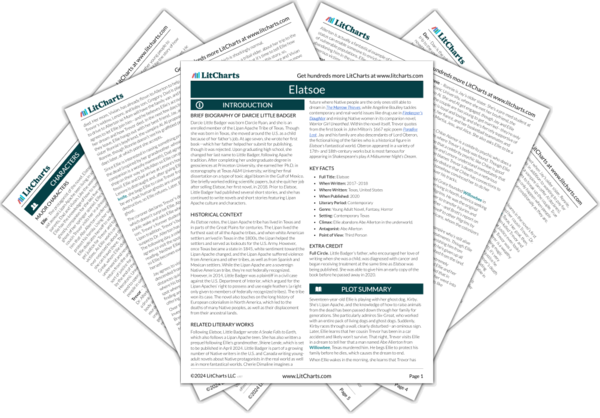Jay Quotes in Elatsoe
“What a view,” Al said, and he inhaled deeply. “Eugh. Bad idea. Can you smell that? Rotting fish, sewer discharge, rust. I hate how spoiled the world has become.” Al coughed, shuddering, and spat into the river. [...] “It’s the running water,” he explained. “Makes me sick. Don’t know why. Something curse-related.”
“Mom told me, ‘Don’t be like Icarus, Ellie. Caution is our friend.’ Because I was immature back then, I asked, ‘Aren’t we supposed to take risks?’”
“That’s a good question,” Jay said. “Not immature at all.”
“Mom thought I was being—in her words—obstinate,” Ellie said. [...] “What I’m trying say is: this summer, investigating my cousin’s murder, we might skirt the line between wise and unwise danger. It’s hard to know that you’re flying too high until the feathers start dropping.”
Ellie couldn’t use the rings, however, because all portal travel had to be approved and facilitated by fairy folk, and fairies didn’t like “strangers.” Strangers, in their opinion, constituted anybody without familial ties to at least one interdimensional person, commonly known as “fae.” That wasn’t Ellie. Every time she had to pay for an expensive airline ticket or miss a field trip, her disdain for the otherworldly snobs increased. It seemed cruel that humanoids from a different realm could discriminate against her—and others—on her own homeland. The “fair” in “fairy” didn’t stand for justice, however, and they didn’t care about any rules but their own.
If the US had also controlled an army of dead hounds, there’d probably be no Lipan left alive. It was difficult enough to survive their deadly magic, powers that weren’t the same as ghosts. Magic came from an alien place, and the use of too much corrupted the natural state of the Earth. That’s what scientists were reporting, anyway. [...] In fact, that year, the Intergovernmental Panel on Magic Use, which was backed by over two hundred scientists, published a warning that excessive magic posed an existential threat, one nobody understood completely and very few people seemed to take seriously.
Ellie’s ancestors had known—hundreds of years before any report by an intergovernmental group—the damage magic could cause.
Ellie always reasoned that Six-Great lived in a more violent era, one that transformed pacifists into warriors. Six-Great didn’t fight because she enjoyed it; she had to protect her family and friends from genocide.
There were still people to protect. That, Ellie now realized, would never change.
“There’s a lot I want to learn,” Ellie said. “My mother, her mother, and my grandmother’s mother taught me about the way of our land, our dead, and our monsters, but the times have changed. I need college to prepare for the next Willowbee.”

Jay Quotes in Elatsoe
“What a view,” Al said, and he inhaled deeply. “Eugh. Bad idea. Can you smell that? Rotting fish, sewer discharge, rust. I hate how spoiled the world has become.” Al coughed, shuddering, and spat into the river. [...] “It’s the running water,” he explained. “Makes me sick. Don’t know why. Something curse-related.”
“Mom told me, ‘Don’t be like Icarus, Ellie. Caution is our friend.’ Because I was immature back then, I asked, ‘Aren’t we supposed to take risks?’”
“That’s a good question,” Jay said. “Not immature at all.”
“Mom thought I was being—in her words—obstinate,” Ellie said. [...] “What I’m trying say is: this summer, investigating my cousin’s murder, we might skirt the line between wise and unwise danger. It’s hard to know that you’re flying too high until the feathers start dropping.”
Ellie couldn’t use the rings, however, because all portal travel had to be approved and facilitated by fairy folk, and fairies didn’t like “strangers.” Strangers, in their opinion, constituted anybody without familial ties to at least one interdimensional person, commonly known as “fae.” That wasn’t Ellie. Every time she had to pay for an expensive airline ticket or miss a field trip, her disdain for the otherworldly snobs increased. It seemed cruel that humanoids from a different realm could discriminate against her—and others—on her own homeland. The “fair” in “fairy” didn’t stand for justice, however, and they didn’t care about any rules but their own.
If the US had also controlled an army of dead hounds, there’d probably be no Lipan left alive. It was difficult enough to survive their deadly magic, powers that weren’t the same as ghosts. Magic came from an alien place, and the use of too much corrupted the natural state of the Earth. That’s what scientists were reporting, anyway. [...] In fact, that year, the Intergovernmental Panel on Magic Use, which was backed by over two hundred scientists, published a warning that excessive magic posed an existential threat, one nobody understood completely and very few people seemed to take seriously.
Ellie’s ancestors had known—hundreds of years before any report by an intergovernmental group—the damage magic could cause.
Ellie always reasoned that Six-Great lived in a more violent era, one that transformed pacifists into warriors. Six-Great didn’t fight because she enjoyed it; she had to protect her family and friends from genocide.
There were still people to protect. That, Ellie now realized, would never change.
“There’s a lot I want to learn,” Ellie said. “My mother, her mother, and my grandmother’s mother taught me about the way of our land, our dead, and our monsters, but the times have changed. I need college to prepare for the next Willowbee.”











